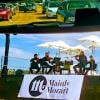
It was an emotional moment reminiscent of the final scene in Field of Dreams, when Saturday night a seemingly endless line of cars snaked its way toward the vibrantly glowing stage in front of the Del Mar Racetrack Arena — all for a chance to enjoy a concert of classical music performed live by a 23-member chamber orchestra.
Presented by San Diego’s Mainly Mozart, the sold-out, drive-in concert attracted a capacity crowd of 320 cars with an audience estimated at over 1000. Tickets (per car) were sold in advance for $45 and $100.
Conducted by Mainly Mozart’s music director, Michael Francis, the program interpolated the luster of Antonio Vivaldi’s The Four Seasons with the sultry tango allure of Astor Piazzolla’s Four Seasons of Buenos Aires. The concert was also historic (in the annals of COVID-19) because it represented the first time that a full-scale professional chamber orchestra performed live in California (and probably the nation) since the onset of the pandemic.
Over the course of four drive-in performances, Francis and the Mainly Mozart Festival Orchestra will perform works including Mozart’s Horn Concerto No. 3 in E-flat Major with LA Philharmonic principal horn, Andrew Bain, and Symphony No. 41 in C Major (“Jupiter”); Beethoven’s Symphony No. 8 in F major and Piano Concerto No. 5 in E-flat Major (“Emperor”), with Anne-Marie McDermott as soloist; ending the festival Oct. 24 with Mendelssohn’s Symphony No. 4 in A Major (“Italian”).

In accordance with COVID-19 protocols, orchestra members and staff are tested for the virus prior to rehearsals and performances. Masks are worn by all the musicians, with brass and wind players shielded. There are no intermissions and patrons are not allowed to leave their cars.
In order to accommodate the 23-member ensemble (and allow for appropriate distancing) a stage 68 feet wide, 5 feet high, and 58 feet deep was constructed for the festival, complete with full lighting and projections and large screens for live video on each side. The performance was amplified through an excellent sound system and also simulcast on FM radio for those who preferred to listen using their in-car sound systems.
As if the difficulties imposed by the pandemic were not enough, on Saturday a pea-soup fog swirled in from the nearby coastline and enveloped the stage. It prompted Francis to observe that the fog seemed yet another challenge we would have to do our best to cope with and rosin, according to the musicians, was in short supply by the end of the performance.

Now in its 31st season, the Mainly Mozart Festival Orchestra has traditionally showcased principal-chair musicians from around the country. Saturday’s five violin soloists included Martin Chalifour (concertmaster of the Los Angeles Philharmonic); David Chan (concertmaster of the Metropolitan Opera Orchestra); David Kim (concertmaster of the Philadelphia Orchestra); David Coucheron (concertmaster of the Atlanta Symphony); and Jun Iwasaki (concertmaster of the Nashville Symphony).
Each of the Vivaldi seasons was assigned to a different soloist: Chan (“Spring”); Coucheron (“Summer”); Kim (“Autumn”) and Chalifour (“Winter”). The effect was tangible as each violinist infused their season with a distinct sense of individuality.
In contrast, Iwasaki was presented as the solo-violin “dancer” in all four movements of the Piazzolla. It was a role he embraced fully and expertly, exhibiting a combination of sultry, smoldering expression, fiery angular attacks, and grand cinematic gestures.
There is, however, no way to describe in words the sense of joy that was manifested by the orchestra. And whatever issues were created by the moistness of the fog, it did not dampen the warmth of musicality produced by Francis and the ensemble.
Someday, when we can finally look back on these days of trial and survival, wonderful events like this concert will stand out as bright moments to remember.




